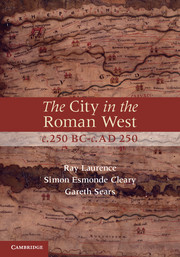Book contents
- Frontmatter
- Contents
- Illustrations
- Preface
- Introduction
- 1 The creation of an urban culture
- 2 Colonisation and the development of Roman urbanism
- 3 City foundation, government and urbanism
- 4 The reception of Roman urbanism in the West
- 5 Town planning, competition and the aesthetics of urbanism
- 6 Defining a new town: walls, streets and temples
- 7 Assembling the city 1: forum and basilica
- 8 Assembling the city 2: baths and urban life
- 9 Assembling the city 3: theatres and sacred space
- 10 Assembling the city 4: amphitheatres
- 11 The Roman city in c. AD 250: an urban legacy of empire?
- Bibliography
- Index
4 - The reception of Roman urbanism in the West
Published online by Cambridge University Press: 05 June 2012
- Frontmatter
- Contents
- Illustrations
- Preface
- Introduction
- 1 The creation of an urban culture
- 2 Colonisation and the development of Roman urbanism
- 3 City foundation, government and urbanism
- 4 The reception of Roman urbanism in the West
- 5 Town planning, competition and the aesthetics of urbanism
- 6 Defining a new town: walls, streets and temples
- 7 Assembling the city 1: forum and basilica
- 8 Assembling the city 2: baths and urban life
- 9 Assembling the city 3: theatres and sacred space
- 10 Assembling the city 4: amphitheatres
- 11 The Roman city in c. AD 250: an urban legacy of empire?
- Bibliography
- Index
Summary
Greatest of censors, prince of princes, though Rome owes you so many triumphs, so many temples coming to birth, so many reborn, so many spectacles, so many gods, so many cities.
(Mart. Ep. 6.4)Rome held an empire in which there were cities, and the Roman governors of the West expected to view a provincial landscape in which there were cities that could be recognised as having distinctly Roman urban forms. This chapter seeks to examine how the Roman concept of the city was received and reproduced across the provinces of the former barbarian West. In the past, the excavated remains of the cities of the Roman Empire have been used to establish the spread of civilisation across the West. The straight lines of the grid-plan of the towns were equated at the turn of the twentieth century with the notion of a rational city, whether in the past, present or future. The Roman city in the West was perceived as a bringer of civilisation to the barbarians (see Chapter 5 for further discussion). This perception of the past has been adjusted, but the narrative of the Roman provinces continues to focus on the role of cities and urbanisation. The question for us in this chapter is what features of the Roman conception of urbanism were attractive to these former barbarians in the first or second century AD? Equally important is the question of whether their conception and development of urban forms in the former barbarian West (that is, the Gauls, the Germanies and in Britain) was so different from what was occurring at the same time in other more developed parts of the Mediterranean such as Italy, Spain or North Africa. This chapter will therefore explore the conception of Roman urbanism viewed from the former barbarian provinces of the West rather than from Rome or Italy (a view expressed in the opening quotation, from the late first century AD). These questions have perplexed those studying the origins of towns, particularly in Britain, and have been subject to a reworking of hypotheses and the development of new theories of urbanism.
- Type
- Chapter
- Information
- The City in the Roman West, c.250 BC–c.AD 250 , pp. 91 - 114Publisher: Cambridge University PressPrint publication year: 2011



